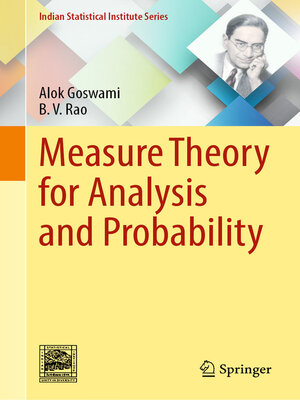Measure Theory for Analysis and Probability
ebook ∣ Indian Statistical Institute Series
By Alok Goswami

Sign up to save your library
With an OverDrive account, you can save your favorite libraries for at-a-glance information about availability. Find out more about OverDrive accounts.
Find this title in Libby, the library reading app by OverDrive.



Search for a digital library with this title
Title found at these libraries:
| Library Name | Distance |
|---|---|
| Loading... |
This book covers major measure theory topics with a fairly extensive study of their applications to probability and analysis. It begins by demonstrating the essential nature of measure theory before delving into the construction of measures and the development of integration theory. Special attention is given to probability spaces and random variables/vectors. The text then explores product spaces, Radon–Nikodym and Jordan–Hahn theorems, providing a detailed account of 𝐿𝑝 spaces and their duals. After revisiting probability theory, it discusses standard limit theorems such as the laws of large numbers and the central limit theorem, with detailed treatment of weak convergence and the role of characteristic functions.
The book further explores conditional probabilities and expectations, preceded by motivating discussions. It discusses the construction of probability measures on infinite product spaces, presenting Tulcea's theorem and Kolmogorov's consistency theorem. The text concludes with the construction of Brownian motion, examining its path properties and the significant strong Markov property. This comprehensive guide is invaluable not only for those pursuing probability theory seriously but also for those seeking a robust foundation in measure theory to advance in modern analysis. By effectively motivating readers, it underscores the critical role of measure theory in grasping fundamental probability concepts.







